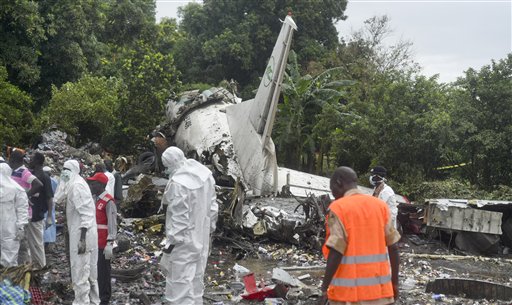An Associated Press reporter at the scene of the crash saw the bodies, including those of women and children. Parts of the plane were scattered in a bushy area on banks of the Nile with a few homes nearby. Packages of cheap sandals, cigarettes, beer and crackers were strewn amid the wreckage. The white tail section protruded from the brush.
The smell of fuel permeated the crash site, located about 1 mile (1.6 kilometers) from Juba’s international airport. The tail and part of the fuselage remained attached to each other but the wings, propellers and the front of the plane were completely smashed.
Bashir Yashin, who saw the plane come down, said he first thought it might crash into a market area before the pilot apparently diverted it. Another witness, Angelo Kenyi, said a child, who looked no more than a year old, and an elderly woman were pulled from the fuselage.
The plane, which had been bound for the Paloich oil fields in Upper Nile state, was registered in Tajikistan and belonged to Allied Services Limited, said Ateny Wek Ateny, a spokesman for South Sudanese President Salva Kiir.
A spokesman for the Armenian Foreign Ministry, Tigran Mkrtchian, confirmed five Armenian crew members died.
Besides the five Armenians, a Russian crew member also died as well as 12 South Sudanese passengers, Ateny said. He said there were three survivors, all South Sudanese.
He also said 10 people on the ground were killed. But witnesses and first responders said no one had been on land in the crash site when the plane came down nto a swampy, muddy farm plot with no structures.
It is common for members of the security forces to put family members on cargo planes to Paloich even if they are not on the manifest, according to Kenyi Galla, assistant operations manager for Combined Air Services, a company that operates chartered flights across South Sudan. The doomed flight was not chartered by his company, Galla said.
“Normally [this flight] used to carry 12 people, but the problem is they added more people,” he said. “This plane is just for cargo, not for passengers. It was just chartered for goods.”
Russian television channel LifeNews quoted an unnamed source at the Russian aviation agency as saying that the plane appeared to have been overloaded and that it was made in the Soviet Union in 1971.
Ateny, the presidential spokesman, denied that security officials at the airport force cargo planes to transport passengers.
“The company has to accept it is taking passengers along with the goods. The company must handle this,” he told AP.
Stephen Warikozi, CEO of the Civil Aviation Authority, told AP an investigation has opened into the cause of the crash.
Many parts of South Sudan, which became an independent nation in 2011, have been hit by violence since December 2013, with government forces under President Salva Kiir battling rebels led by his former deputy, Riek Machar. Fighting persists despite a peace agreement signed in August.
The war first broke out in Juba but for many months the capital has been peaceful.














